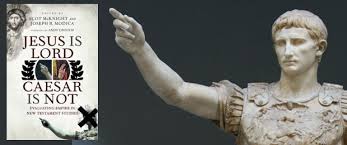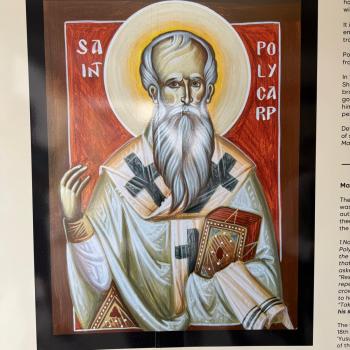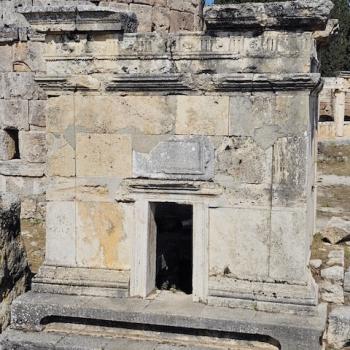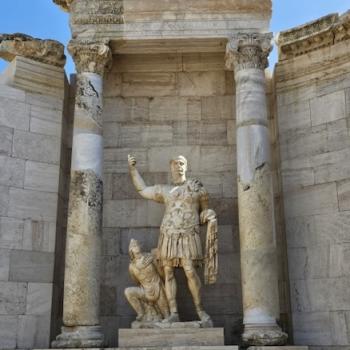One of the obvious growth areas in the study of the Gospels is the study of Matthew as a possible vehicle of anti-imperial rhetoric, largely due to the voluminous output on the subject by Warren Carter (20 articles and more). In the chapter by Joel Willits on Matthew he interacts with various of the major points Carter and others have been making about Matthew. On the surface of things, Matthew seems an unlikely candidate for anti-imperial rhetoric, being not only the Gospel that gives us ‘render unto Caesar’ but also the Gospel that seems to like Pilate better than the Herods. It is also in some ways the most obviously Jewish of the four Gospels, which may or may not favor Empire critique, depending on when Matthew was actually written. Willits reviews the history of this approach to Matthew, and interestingly it only goes back to 1995 or so, unlike Empire studies in relationship to Paul or Revelation for instance. The focus of Willits review is on the article of Carter’s which appears in the collected essays volume entitled Empire and the NT. Willits is prepared to agree with Carter that Matthew is anti-Rome, but his political vision is not reducible to that. Willits says that Carter is of course right that politics and religion were interwoven in antiquity, and he prefers a reading of Matthew that reflects such a reality to an overly spiritualized reading of Matthew.
One of Carter’s fundamental assumptions, undergirding his reading of Mathew, is that Jesus himself was crucified for being anti-Rome. Of course Matthew’s Gospel does not actually directly say anything like that, so Carter’s fall back position is to talk about hidden scripts in the text of Matthew. Are there then hidden scripts of resistance to Rome in Matthew? (p. 87).
Part of the problem with Carter’s analysis is it is based on a Schweitzerian reading of Matthew’s and behind that Jesus’ eschatology. So for example Carter (quoted by Willits) says: “Jesus exemplified the politics of disguise and anonymity, notably through his proclamation and demonstration of the rumor that God’s imminent removal of Rome’s world and the establishment of God’s empire.” (p. 87 is where the quote is). The problem is that Mathew’s Gospel, following Mk. 13.32, and behind that Jesus himself, flatly denies any sort of necessary imminence of the return of Christ, or of the replacement of Rome. Instead the Kingdom of God is already breaking into the midst of God’s people in Israel without displacing Herod or Rome or anybody else. This is not because the Gospel is purely spiritual, its because Jesus is interested in forming his own social community, not displacing another one. Furthermore, since this Gospel was not a public document or a tract tacked up on a synagogue wall, but rather insider literature, it is not at all clear that there was any need for ‘hidden transcripts’ between Matthew and his audience. It may be another matter when we are talking about the public discourse of Jesus, but Carter’s focus is on Matthew and his community. And where exactly was that community that supposedly was wrestling with the Empire question which was omnipresent in their world and minds? Most scholars think this Gospel was written in Antioch, and a second possibility in Capernaum or Galilee somewhere. Were either of these places hotbeds of Empire criticism and ferment among Jews and followers of Jesus? Further, if that was true, why is the clear tension in the Gospel between followers of Jesus and other Jews, and not with the representatives of Empire. Indeed, in Matthew’s Gospel THE representative of Empire’s wife declares Jesus innocent warns her husband against violent actions, and Pilate tries to release Jesus? If this was Empire critique, we would expect a very different portrayal of Pilate and his wife. Pilate washes his hands of the coming crucifixion of Jesus, and clearly is depicted as not wanting anything to do with this sordid affair. This sounds more like apologetics than Empire criticism! Jesus wasn’t guilty and Pilate didn’t think so either. As for the Jewish authorities representing Rome and its views— in this Gospel they don’t! Pilate doesn’t want to agree with the Jewish authorities The critique of the Jewish authorities is one thing, especially when they are at variance with the portrayal of the Roman authorities. A critique of Rome is another thing. In other words, you can’t portray the Jewish authorities and antagonists of Jesus as Rome’s puppets or partners. It just doesn’t work. If Jesus’ Gospel is counter-cultural, the question is— which culture is it countering and critiquing? On the one hand one could say it is all fallen human cultures, without the Roman Empire especially called out. Mt. 4.8 which speaks of the kingdoms plural of this world which are on offer not by Rome but by Satan favors such a view. On the other hand the specific evidence suggests an inter-Jewish debate with some forms of Judaism being mainly critiqued. The main empire being opposed is the Satanic one, all pervasive evil which involves all fallen human kingdoms. As Peter Oakes says, any Gospel which says render unto Caesar what is Caesar, not only can’t be for open revolt against Rome and its taxes, it would appear unlikely that Rome is the primary target of criticism in such a Gospel and for good reason. The author believes that ultimately God will judge the world, through Jesus, and that will happen at the return of Christ, not before, and that return is not said to be definitely imminent. What is said is that no one, not even Jesus knows when it is coming!! In the meantime, the way God’s saving reign is working in the world is by changing people by means of love, mercy, forgiveness and non-violence. If Pilate had heard that these were the weapons Jesus was using against Rome, he would have just laughed, and not seen it as anti-imperial at all. Stupid maybe, utopian maybe, but not inherently anti-imperial.
It was about as anti-imperial is when Americans like me were protesting not government in general but the abuse of power that sent us to Vietnam, and we protested by putting daisies in the gun barrels of the National Guard. They did not see it as a threat, or even as a critique of the basic role they played in society. One doubts that Matthew’s community would have seen this Gospel as specifically targeting Rome for criticism either. Willitts own conclusion deserves to be quoted verbatim: “Matthew was neither critiquing ’empire’ per se nor singling out Rome uniquely. To take this view would be inappropriately to diminish Matthew’s message. Jesus is not only or primarily God’s answer to Rome. Jesus is God’s answer to Israel’s unfulfilled story. A story, as it turns out, not only about Israel. It is a story that encompasses all the kingdoms and nations of the world (Mt. 4.8;28.19-20).”(p. 97).
Amen to that assessment.













